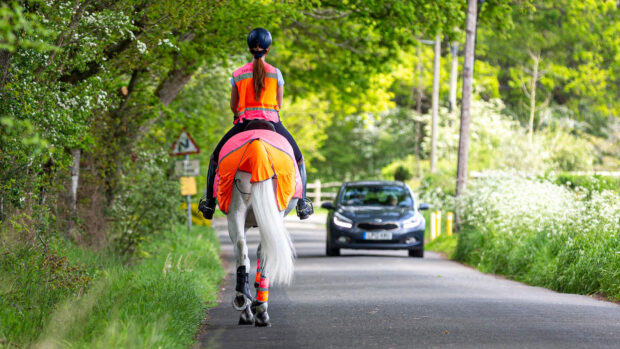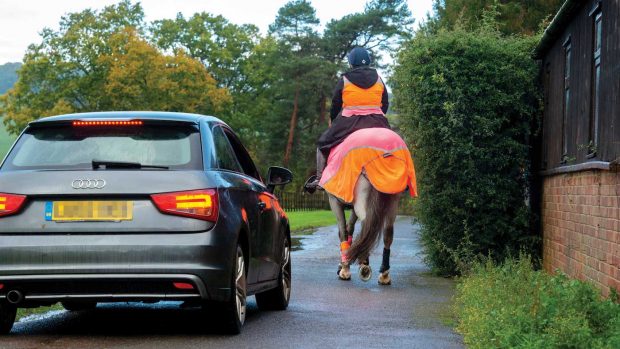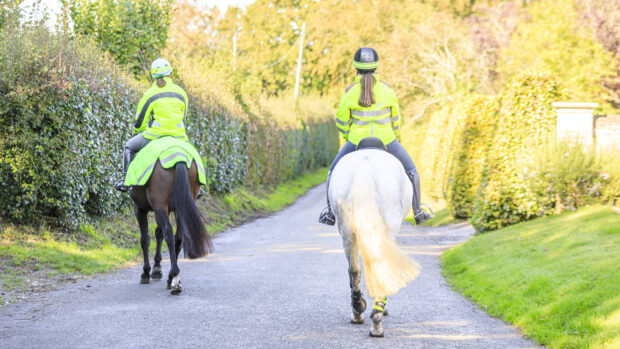Winter weather can be unpredictable, the light can diminish rapidly and horses can become overly-fresh due to lack of exercise. Solicitor Emma Melia, who specialises in serious personal injury litigation, explains how to be prepared if you're heading out hacking
The route
- Before you even get started make sure there is a good system in place for gritting and clearing the yard in places that slippery hooves are likely to contact.
- Don’t allow water to run across the yard or walkways.
- Plan your ride in advance — and don’t attempt an unfamiliar route for the first time which might take longer than expected, leaving you riding in the dark.
- If you go alone let someone else know where you are going and roughly when you plan to return.
- Factor in bad weather/light fading earlier than expected.
- Avoid going out on tarmac roads if it is icy or snowy as your horse is far more likely to slip.
- Avoid busier times on the roads during the typical school/commuter run.
- Check the weather forecast and useful websites for road updates are www.trafficengland.com or www.traffic-wales.com
The horse and rider
- Make sure your horse is warm by using a well-fitting and secure exercise blanket.
- Don’t take your horse straight onto the road if he is likely to be overly fresh — consider lunging in a field or arena first.
- Discuss winter studs with your blacksmith.
- Avoid hoof balling in snow by using Vaseline or other grease
- Keep your hands warm with good quality riding gloves with a good grip to ensure that your hands can maintain adequate grip of your reins in wet weather conditions.
- Use rubber grip reins in wet conditions.
- Wear reflective clothing even if not riding in reduced light as it will increase your visibility and alert drivers to slow down. Research has shown that a driver travelling at 30 mph has three valuable extra seconds of reaction time by noticing a rider in high-vis gear. You can’t be held responsible if you don’t wear one but you might prevent an accident if you do.
- Hat and head cams — use of a hat cam may provide indisputable evidence which may be very useful if you are involved in an accident either to defend an allegation that you caused it or proving that someone else did.
Road etiquette
- While riders are allowed to ride two abreast on the road, and many do so to make a larger obstacle for drivers to pass so they pay greater attention while doing so (as well as to protect inexperienced horses or riders), sometimes this can backfire by annoying a driver, who then accelerates past at speed. So consider whether riding two abreast is necessary and if it’s possible to drop to single file to make it easier for a driver to pass, then consider doing so.
- Treat drivers with respect — thank them if they slow down and pass responsibly.
- A lot of people aren’t sure how to safely pass a horse when driving. “Out of the 2,070 accidents reported to the BHS, 75% were caused by the vehicle not leaving enough room while passing the horse,” says Lee Hackett, British Horse Society (BHS) director of policy. It is worthwhile considering notifying the BHS of a “near miss” so they can gather statistics to help them with their continued efforts to campaign for greater road safety for horse and rider. Visit www.bhs.org.uk
- There is a duty on motorists to drive safely, slow down and pass riders with sufficient clearance but there is also a duty on a rider to act responsibly and only ride in public if it is safe to do so. Even the most minor collision between a vehicle and a horse could have life threatening consequences for rider and animal.
Like this? You might also enjoy reading these:
9 ways to train your horse out hacking for success on competition day
7 reasons to love winter (plus a few reasons not to!)
If an accident occurs….
- Phone for help if you are injured or your horse needs assistance.
- Get the number plate and details of the driver.
- Get contact detail of any witnesses.
- If appropriate seek specialist legal advice to cover your losses, medical treatment and vet bills.
- Report the accident to the police and your insurance company.
- Accidents do happen and riding has risks associated with it like most physical activities — it is there to be enjoyed and not to instil a fear of being sued. However you do have a legal right of redress and other road users should be held to account if they act wrongly and negligently, actions which can unfortunately lead to serious life changing injury to you and your horse.
Insurance
- If you are involved in an accident whether it is your fault or not it is wise to check that you have adequate insurance in place. Vets bill can be huge and so insurance is wise. If your horse causes an accident a lot of damage could be caused to a car or others and you don’t want to find yourself without insurance and be personally liable.
Emma Melia is a solicitor and lead litigator within Spencers Solicitors catastrophic injury team. Emma has over 20 years’ extensive experience helping people who have suffered life changing injuries, including those involving traumatic brain and spinal cord damage.
Emma also writes about horse riding safety on her blog at www.SpencersSolicitors.com/blog



